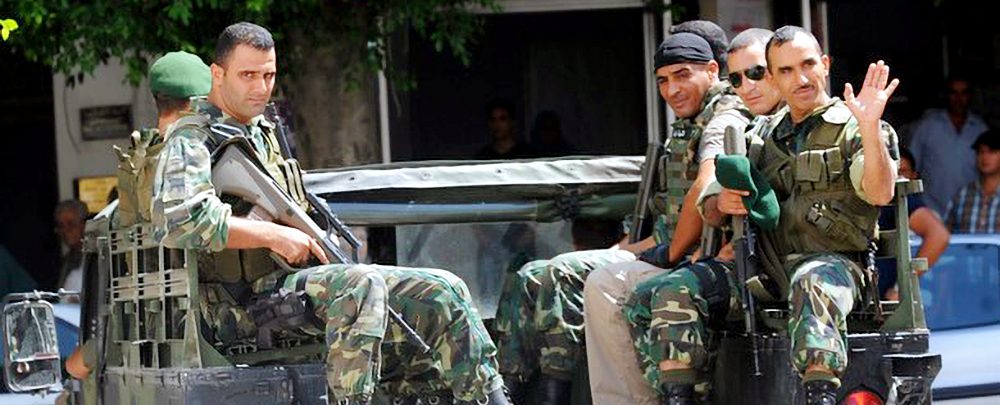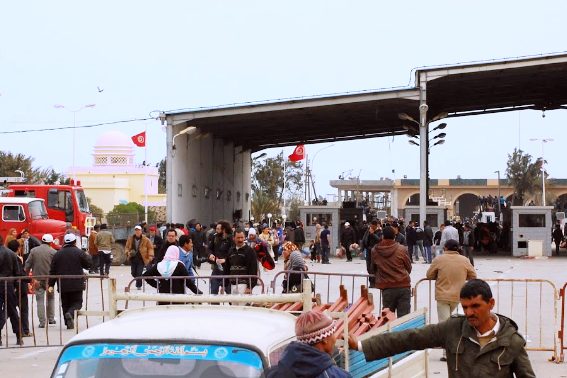The National Center for Continuing Training and Professional Promotion Tunisia
Spotlight
Tunisia's Evolving Counterterrorism Strategy

Members of the Tunisian Army in Tunis. (Photo: World Armies)
Strategic enhancements in Tunisia's security apparatus have yielded notable progress in dismantling terrorist cells, tightening control over the country's porous borders, degrading the capabilities of violent extremist groups affiliated with al Qaeda in the Islamic Maghreb and the Islamic State (ISIS), and countering terrorist financing. The latter improvement was rewarded in October 2019 when the Financial Action Task Force, an intergovernmental organization established by the G7 countries to protect against money laundering and terrorist financing, removed Tunisia from its blacklist. In addition to reducing the number of terrorist incidents, these reforms have contributed to a notable improvement in the overall security situation in Tunisia.
As has been demonstrated time and again in the constantly evolving field of counterterrorism, however, such successes can be fleeting. The Tunisia experience, nonetheless, provides an opportunity to take stock of progress made, as well as further areas for improvement.
Improving Counterterrorism Capabilities
"The Tunisian military has made notable progress in revising its doctrine and improving its operational readiness and combat competency."
Tunisia has made significant progress detecting and preventing terrorist attacks like the 2015 assaults on the Bardo National Museum and Sousse beach resort and the dramatic 2016 storming of the southeastern Tunisian town of Ben Guerdane by Tunisian militants affiliated with ISIS in Libya.
With the escalating terrorist threat in the mid-2010s, amplified by Libya's fragmentation, Tunisia recognized that it had to recalibrate its defense strategy and counterterrorism force structure as part of a multilayered approach to security. Implementing these goals, however, required getting rid of an outdated conventional military posture and counterterrorism practices that were ill-suited to terrorist adversaries that were mobile and flexible.
The Tunisian military—which historically had been marginalized, ill-equipped, and uncoordinated—has made notable progress in revising its doctrine and improving its operational readiness and combat competency. Security assistance, involving tactical and operational training, advising, equipment, and educational exchanges has helped improve overall military effectiveness. The United States, France, Germany, the United Kingdom, and NATO have played an important role in these efforts to upgrade the professionalism and readiness of the military. As a result, the force today is more dynamic, better equipped and trained, and efficient in executing a diverse set of operations and missions.

The border post at Ras Ajdir, the northern terminus of Tunisia's anti-terror barrier.
(Photo: Dmitry Kiyanovsky)
At Tunisia's volatile borders in the south with Libya, the government has built a 125-mile antiterror barrier, and the military has taken over enforcement missions that were once the responsibility of the Ministry of the Interior (MOI). In the process, the military has gradually learned to combine the application of force with some population-centric operations aimed at gaining support of Tunisians living in isolated border communities. The military has also become quite effective at conducting joint counterterrorism operations with both Algerian and American forces. This progress has taken hold while the military's leadership has avoided being pulled into the political fray.
Intelligence Gathering and Analysis
Accompanying this ongoing military evolution have been improvements in intelligence gathering and analysis. The collapse of authoritarian rule in January 2011 spurred efforts to revitalize the intelligence community by first depoliticizing the intelligence sector, which had long been used to monitor and suppress dissent. As part of this process, Tunisia's post-revolutionary government first abolished and disbanded several of the old regime's intelligence services, notably the Central Directorate of General Intelligence, the Directorate General of Anti-Terrorist Prevention, and the Joint Committee for Intelligence and Border Control. The government then began the process of setting up new bodies to face mounting security and violent extremist challenges. In November 2014, the government of then-Prime Minister Mehdi Jomaa created a new military intelligence agency, the Agence des renseignements et de la sécurité pour la défense. That same month, the Ministry of Interior set up a central Strategic Planning Unit to enhance its "efficiency and effectiveness," and to "tackle security threats through forward planning."
Interagency Coordination
In December 2014, the government created two networking poles—the security unit and judicial unit—to improve interagency coordination in matters of national security such as terrorism and organized crime. The security pole is embedded within the Ministry of Interior and serves as a sort of fusion center whose main task is to analyze and share actionable intelligence with Tunisia's security services. The judiciary pole brings together prosecutors, investigative judges, and other representatives to enable better investigation of terrorist cases and accelerate judicial proceedings.
The Ministry of Defense (MOD) created its own nascent information-sharing platform, or "fusion center," to streamline operations and quickly disseminate information, particularly tactical intelligence to military field commanders. The further intent has been to upgrade cooperation with the MOI's security forces, especially the Anti-Terrorism Brigade and the National Guard Special Unit. It also aimed to improve coordination within the military's Joint Task Forces that operate in Tunisia's border areas and in the sparsely populated military exclusion zones. These efforts have contributed to improvements in cooperation between the tactical units of the MOD, which have responsibility for detection, disruption, and arrests at the military buffer zones, and the MOI, whose task is to monitor and thwart plots in the populated areas of the border, with the military "providing on-call backup."
In 2016, the Tunisian authorities established the Centre national du renseignement, a testament to the growing importance of intelligence sharing and operational coordination between the different security services in the fight against terrorism. This national intelligence agency, however, is still not fully operational, concretely illustrating the difficulty of transcending bureaucratic politics, inter-service rivalries, and old habits of information hoarding.
Holistic Approaches
The Tunisian government also beefed up its counterterrorism architecture with the creation in 2015 of a National Commission for the Fight against Terrorism (CNLCT) and adoption in 2016 of a national strategy to counter terrorism. In addition to serving as a focal point for Tunisia's counterterrorism strategy, the CNLCT is authorized to freeze the assets of persons or organizations suspected of providing material support for terrorism. The government and its international partners have furthermore worked to counter violent extremism through the development and implementation of several national programs that run the gamut from targeted online counter-messaging campaigns against violent extremist narratives to establishing community reintegration centers for extremist offenders who were released from prison. Other noteworthy efforts included investments by the Ministry of Higher Education and Scientific Research in strengthening the evidence base of the causes of extremist violence in Tunisia. The CNLCT also implemented, in partnership with international actors, a series of initiatives to engage civil society and the private sector to proactively respond to the challenge of violent extremism.
Remaining Gaps
While Tunisia has made notable progress in beefing up its counterterrorism capabilities, the sustainability and ultimate effectiveness of these reforms is dependent on developing better integrated policy actions and addressing the causes, not just symptoms, of terrorism and violent extremism.
"The defense establishment still lacks an overarching framework or white paper that clearly defines the military's roles, missions, and goals in counterterrorism."
In the military realm, the country's armed forces are more capable and nimbler, but the defense establishment still lacks an overarching framework or white paper that clearly defines the military's roles, missions, and goals in counterterrorism. For example, the military's functions on the border are still ill-developed as are its population-centric operations, which have yet to be "formalized into doctrine and training." The military also lacks effective policies to deal with the consequences of the militarization of the border with Libya, which have negatively impacted pastoralists and informal cross-border exchanges. The disruption of such activities, without addressing high rates of unemployment, has strained the military's relations with pastoralists, farmers, and traders. Further deterioration of such relations would undermine efforts to cultivate trust and confidence of border communities, which constitute a vital source of information on security issues affecting the border areas.
There have also been shortcomings in process and implementation. The drafters of the counterterrorism strategy failed to set up coordination mechanisms that could oversee its implementation. Underpinning these problems is that the strategy was not developed in a transparent, inclusive, and multidisciplinary manner, and hence did not benefit from the input of a variety of governmental and nongovernmental actors. This has hindered the continuity in operationalizing the strategy when there are changes in civilian leadership.
This is probably best exemplified in the drafting and implementation of the National Strategy to Counter Extremism and Terrorism. Early work on the strategy began under Moncef Marzouki, who had been interim president from 2011 to 2014. Hundreds of academics and officials from relevant government ministries, agencies, and institutions contributed to the draft document. However, the ruling party following the 2014 elections prepared its own distinct strategy, negating some of the intellectual capital and broad interagency ownership that had been generated via the earlier process.
Strengthening Counterterrorism Efforts by Improving Oversight
As Tunisia develops its new national security strategy and embarks on operationalizing its counterterrorism strategy, there is an opportunity to shift away from what have hitherto been mostly hard security approaches to fighting terrorism. Key to this process will be to curtail the misuse or abuse of counterterrorism laws and measures that have been enacted. In 2017, the UN Special Rapporteur on the Promotion and Protection of Human Rights and Fundamental Freedoms while Countering Terrorism called for "immediate measures to discontinue the abusive, and internationally illegal, practice of routinely extending the extraordinary powers conferred to law enforcement institutions under the state of emergency." In early 2019, the Special Rapporteur again expressed concern about the continuing abuse of laws relating to the state of emergency, prolonged pretrial detentions, and allegations of ill-treatment and torture.

A Tunisian citizen talking to a member of the national guard. (Photo: World Armies)
Amnesty International, the World Organization against Torture (OMCT), and other human rights organizations have also expressed rising concerns about the excessive use by the MOI of opaque administrative control measures, known as Fichiers S, that are imposed in "a discriminatory and disproportionate manner," and without any form of judicial oversight. Even judges ignore the classification criteria that put an individual on a watch list. At first, measures such as the infamous S17 orders were designed to monitor and control individuals suspected of violent extremist ties and were only applied at Tunisia's border crossing points. Over time, however, the police and National Guard have used these measures to cast a wide net that ensnared many Tunisians, some on the basis of their religious beliefs, dress codes, or family ties to individuals who joined terrorist organizations. Le Monde describes a "Kafkaesque," or nightmarish, system that has put tens of thousands of Tunisians under constant police surveillance and restrictions, including the prohibition to travel, placement under house arrest, and constant summons to report to police stations without any form of judicial authorization.
Individuals subjected arbitrarily to such restrictions face nearly insurmountable odds to challenge them, particularly since they are not served with written notification of the measure and the MOI does not provide any justification for such administrative decisions. The few that have managed to get an administrative court to issue a temporary suspension of the restrictions placed on them until there is a verdict on their case have been unable to get confirmation from the MOI that the S17 measures were actually lifted. According to OMCT, "The Ministry of the Interior often disregards these judicial decisions," perpetuating "a clear imbalance between an all-powerful security apparatus and a relatively powerless judiciary when it comes to protecting the rights and freedoms of citizens."
The MOI justifies these extraordinary measures as necessary to fight terrorism. But their effectiveness is undermined if such actions do not abide by the principles of necessity and proportionality as prescribed in Article 49 of Tunisia's Constitution and in the international human rights laws that the country has ratified. Measures that have no clear legal basis and that are not subject to judicial oversight result in a lack of accountability and effective impunity for police misconduct. This entrenched impunity contributes to aggravating the grievances of the thousands of Tunisians who feel traumatized and stigmatized by their encounters with the security sector.
"Tunisian authorities should strengthen judicial oversight and accountability mechanisms [over measures to fight terrorism]."
To rebuild trust in the security and judicial institutions and to prevent another resurgence in radicalization and recruitment by violent extremist groups, Tunisian authorities should strengthen judicial oversight and accountability mechanisms as safeguards against the abuse of emergency measures put in place to fight terrorism. In this regard, Parliament should amend the State of Emergency law as well as the 2015 Antiterrorism law to ensure protection of basic human rights in the context of counterterrorism measures. This necessitates ensuring that all security restrictions are prescribed by law and subject to judiciary review. In the case of the antiterrorism law, it means reducing the excessive length of pretrial detention.
Tunisian authorities also need to improve their rehabilitation and reintegration programming as hundreds of inmates arrested on terrorism-related charges are slated to leave prison in the next 3 years. Many of these 2,200 detainees "have faced conditions that could be conducive to recidivism—including abuse—and the prospect of their rehabilitation is minimal."
While Tunisia has made noteworthy progress in its counterterrorism efforts, much more work remains to be done in the qualitative aspects of these efforts if progress is to be sustained. This entails striking a balance between counterterrorism prevention and suppression. It means extending interagency cooperation to ministries that have responsibility for youth empowerment, culture, and social affairs. In addition to better articulating and operationalizing the revised national counterterrorism strategy, the National Counter Terrorism Commission has a critical role to play in facilitating broader coordination and understanding across Tunisian society to strengthen ownership and support for these vital security initiatives.
Additional Resources
- International Crisis Group, "Jihadism in Tunisia: A Receding Threat?" Briefing No. 83, June 4, 2021.
- Francisco Serrano, "Putting up a Fight: Tunisia's Counterterrorism Successes and Failures," Middle East Institute, December 16, 2020.
- Hijab Shah and Melissa Dalton, "The Evolution of Tunisia's Military and the Role of Foreign Security Sector Assistance," Carnegie Endowment for International Peace, April 29, 2020.
- Fred Wehrey, "Tunisia's Wake-Up Call: How Security Challenges from Libya Are Shaping Defense Reforms," Carnegie Endowment for International Peace, March 18, 2020.
- Anouar Boukhars, "Tunisia Crying out for Change," Spotlight, Africa Center for Strategic Studies, September 27, 2019.
- Anouar Boukhars, "The Maghreb's Fragile Edges," Africa Security Brief, No. 34, Africa Center for Strategic Studies, March 2018.
More on: Countering Violent Extremism Security Sector Governance Tunisia
byfordcomprignate.blogspot.com
Source: https://africacenter.org/spotlight/tunisias-evolving-counterterrorism-strategy/

Belum ada Komentar untuk "The National Center for Continuing Training and Professional Promotion Tunisia"
Posting Komentar